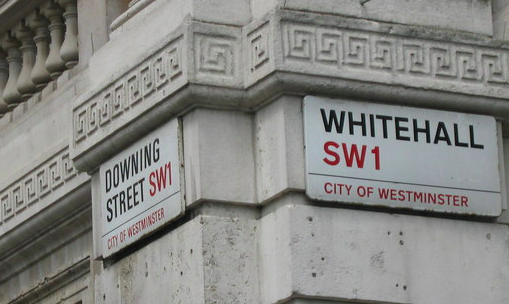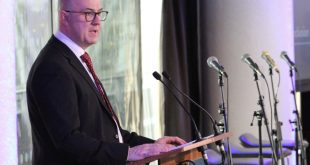
A rollercoaster year has seen the Gambling Review contend with back-to-back government changes and a leadership overhaul at the Gambling Commission, as the industry is promised that the White Paper will be published ‘in the coming weeks’. Before a much-needed break, David Clifton dissects the final industry briefings by new DCMS Gambling Minister Paul Scully and UKGC CEO Andrew Rhodes to take home this Christmas…
Former UK Prime Minister Harold Wilson is famously quoted as having said in the 1960s that “a week is a long time in politics”. He wasn’t wrong. Indeed, recent experience has shown that a week can last a lot longer than even the ‘eight days a week’ that the Beatles sang about in that same decade almost 60 years ago.
Why do I say that? I will tell you.
In June this year, the then Gambling Minister Chris Philp confirmed that the Gambling Act Review White Paper would be published “in the coming weeks”.
On the same day that Philp resigned (7 July), his immediate stand-in ministerial replacement Nigel Huddleston towed the same party line in Parliament, stating that the Government would be publishing the White Paper “in the coming weeks”.
Thereafter, as the ‘coming weeks’ fast became the ‘past weeks’, both over the Summer recess and during Liz Truss’s brief tenure as PM, Philp’s short-term replacement as Gambling Minister (Damian Collins) remained noticeably silent.
Then, following his appointment as Gambling Minister in October, Paul Scully introduced what some thought was a subtle change in the rhetoric, confirming on BBC’s ‘Politics Live’ programme that we could expect the White Paper “in the next few weeks”. Some perceived that as meaning sooner than “the coming weeks” but, when pressed on what his own expression meant, he replied (somewhat curiously) that “it depends on how you define the ‘next few weeks’”. We were none the wiser.
By the time he addressed the BACTA Annual Convention on 24 November, we hoped Scully might have had plenty of time to come up with such a definition. If he did, he chose not to share it, deciding instead to revert to the same phrase used by his predecessors when confirming that the White Paper would be published “in the coming weeks”. He gave us only the tiniest further clue, adding: “I’m really hoping that – touch wood – it won’t be long”.
Needless to say, like many others, I was hoping for some greater clarification on timing from the Minister when I attended the Annual GambleAware Conference on 7 December. I listened intently to his keynote speech. His words were very carefully tailored for his audience. I don’t criticise him one iota for that. Did he tell us anything we didn’t know already? No, not really. On the question of timing, he said the government wants to publish the White Paper as soon as it can, but it wants to “get it right”. Well, no-one will argue with that! After all, these words fell from his mouth only one day short of two years since the Gambling Act Review was launched, so the government has had plenty of time to achieve that rather modest objective.
But “when will the White Paper be published” at least half the audience was aching to ask him. He beat us all to the answer. “In the coming weeks” he said, adding this time around: “I want to make clear that the White Paper is not the end of our discussions on these matters”. I didn’t bother to ask how do you define ‘the coming weeks’ because I am utterly convinced we won’t see it until 2023, i.e. precisely what I forecast in my last ‘SBC News Licensing Expert’ article.
Reliable time forecasts seem few and far between within the gambling sector. In September 2021. UKGC Executive Director Tim Miller delivered a speech in which he said: “our planned next step will be a consultation on thresholds for identifying key financial risks: when it comes to significant losses in a very short time, significant losses over time and financial vulnerability”. I was present when he gave that speech. There have been a lot of ‘next steps’ taken by the Gambling Commission in the fifteen months since then but this long-awaited consultation has not been one of them. It really is very much-needed to cast some light on exactly who falls within the category of ‘vulnerable’, it increasingly appearing the Commission considers it is anyone who gambles.
A brief ray of hope shone on this particular horizon in June this year when the Commission assured us that, as part of its ‘ongoing drive to make gambling in Britain safer’, it would “shortly be launching” this consultation. I’m left pondering the question which is sooner: is it “shortly” or is it “in the coming weeks”. Other than concluding that neither is particularly soon, I’m afraid I don’t have an answer to that question.
So what will the White Paper say?
Despite Paul Scully having now had two golden opportunities to provide some clues, he has declined to do so. The best we have had is his avowed intention to “get the balance right” between all sides, whilst wanting to see the industry “flourish”.
This has been reinforced by his boss, Culture Secretary Michelle Donelan, who told the DCMS Committee on 6 December: “The approach we have taken on this one in general is very much to focus on the area which presents the most harm to individuals. One of the problems as we all know is that gambling regulation and legislation has not kept pace with the online world and that is why it is particularly problematic especially around online gambling. What it’s not designed to do is curtail people’s everyday lives or their enjoyment in relation to recreational gambling which has not presented a problem, so it is about getting the balance right”.
Subject to those comments, the best we can do currently is assess what, if any, reliance can be placed on a ‘The Times’ 26 November article entitled ‘Maximum stakes to fix ‘catastrophe’ of online gambling’.
That article claimed that the Governments wants to introduce maximum stakes of between £2 and £5 for online slot machines to create ‘parity’ with those introduced for FOBTs in April 2019, albeit that ‘The Times’ suggested that customers will be able to “make bigger bets only if they can afford to”. In this latter respect, the previous White Paper ‘leak’ on 13 July had suggested that a DCMS consultation would determine whether enhanced checks might be carried out on “the minority of customers” who would wish to stake more than that on online slots, i.e. up to a limit of between £10 and £25 per spin.
It also claimed that “gamblers will also be subject to ‘non-intrusive’ checks on their finances to ensure they are not racking up unsustainable losses”, adding that “these are expected to be credit checks, although the government will consult on the precise mechanism”. That too chimes – at least in part – with the previous White Paper ‘leak’.
‘The Times’ article claimed that ‘ministers also want to introduce more robust age verification to ensure that under-18s cannot do any form of gambling”. This is a ‘new’ suggestion, at least in the sense that it was not mentioned in the previous ‘leak’. Interestingly, the UKGC’s ‘Young People and Gambling Report 2022’ (published on 10 November) hardly excited media headlines as it has done in past years, with the report expressly acknowledging that “the most common types of gambling activity that young people spent their own money on were legal or did not follow age restricted products”, but compelling presentations at the GambleAware Conference on 7 December underlined why this must under no circumstances become a forgotten issue.
The claim by ‘The Times’ that “an ombudsman will be set up to deal with disputes and to protect people’s rights” chimes with the previous leak’s suggestion that a DCMS consultation would be conducted on such a proposal.
So too its article’s claim that “the government will relax regulations for bricks-and-mortar casinos, allowing them to install more machines and extend credit to wealthy foreigners” chimes with suggestions within the previous ‘leak’ of proposed relaxations in those areas for land-based casinos.
One significant new aspect within the ‘The Times’ article is an expectation that the government will drop plans to ban free bets and VIP packages. The previous ‘leak’ suggested that there would be a consultation regarding a ban on online VIP schemes that would cover both (a) bonuses such as free bets based on a customer’s spend or losses and (b) maximum wagering requirements and minimum time limits.
Also worthy of note, ‘The Times’ article claims that the government has “dropped plans to ban gambling companies from sponsoring football shirts for Premier League clubs, favouring a voluntary approach instead”. Whilst not specifically referenced within the previous leak, this has been recognised as the general direction of travel of government thinking in these respects over more recent times.
Unsurprisingly, ‘The Times’ states that ministers hope to introduce the bulk of the reforms using secondary rather than primary legislation, whilst some of the measures, including affordability checks, will be the subject of public consultations. Apart from White Paper proposals that necessarily require legislative change, I foresee a great deal of responsibility for consultation being landed on the laps of the Gambling Commission rather than DCMS, given the wide powers already vested in the UKGC. Some may consider this to be a most undesirable outcome.
With that possibility in mind, it is timely to mention a number of potentially highly salient matters mentioned in the ‘CEO Briefing’ speech given by the UKGC’s CEO Andrew Rhodes on 25 November.
Andrew Rhodes’ ‘CEO Briefing’ speech
Even if you were amongst the more than 80 industry CEOs and trade body representatives who heard this speech in person, you might want to read the speech afresh by following this link. If you weren’t present at the UKGC event on 25 November, I recommend you read it in its entirety.
It contains warning aplenty, including the Gambling Commission’s intentions to:
- enforce compliance obligations from the earliest opportunity,
- conduct “a great deal more interaction with operators than we might have at times previously”, adding that whilst the Commission “will look to be pragmatic if it leads to better results for consumers faster”, it would be “wrong to take an insufficiently robust approach” where “serious breaches have taken place”, and
- “spend more time looking at offers, terms and practices that can disadvantage consumers”; adding the following highly perspicacious comment: “things that [the Commission] might regard as not good enough today might have been best practice ten years ago. That’s the nature of change and improvement”.
However, the speech also contains numerous comments by Andrew Rhodes that the industry should find encouraging, reflecting as they do:
- his stated determination not only to ensure that the Commission’s work is evidence-led and conducted in an open and transparent manner but also to ensure that “what it publishes is meaningful and you can draw reasonable conclusions from it”,
- his acknowledgment that “contrary to what is sometimes said, we are not seeing inexorable growth in gambling”– a comment based on the regulator’s own industry statistics (most recently published on 24 November, together with its contemporaneous analysis of those statistics entitled ‘Changes in the gambling landscape – sharing our latest evidence’) and its market overview (most recently published on 29 November); this should be particularly noted by those outside the industry who, for their own political purposes, mistakenly assert that there has recently been an ‘explosion of gambling’ or maintain that such an explosion is just around the corner (see the BBC’s 7 December article entitled: ‘Gambling: Perfect storm predicted in December, experts say’),
- confirmation of his “strongly-held belief” that the Commission “must always be impartial as a regulator …. not motivated by a particular set of beliefs about the industry we regulate, or the people who use it”,
- his appreciation that operators are “looking to move their customers away from behaviours that present a higher risk to the licensing objectives”, with a number of the larger groups reporting reduced revenues “due to safer gambling measures they are introducing in terms of stake limits and affordability measures they have taken” with ‘a pivot’ in proportionate revenue terms from higher-spending towards lower spending customers,
- his acceptance of feedback that “many businesses and investors have also taken notice and are striving to improve”, reinforced by his comment that “the industry has improved and I do not doubt for a second that there have been big steps forward in lots of areas”,
- the welcome he has given to “seeing companies more proactively managing risk and recognise the importance of sustainability”,
- his assurance that the Commission will be “doing a lot more to engage with industry” adding: “we want that to be increasingly about positive collaboration”, including by working with its licence-holders to deliver “better research, better data focussed on better outcomes for consumers”.
In his speech he also:
- announced that the Commission is planning a one-day conference on 9 March next year, designed to bring together the regulator, operators, researchers and others “to improve how we design and commission research, collect and use data and collaborate to improve the evidence base”,
- expressed his ambition for the Commission to be “a more discursive regulator” with “more discussion and more engagement …. on the right things” and, with this in mind, he is looking to bring together groups of CEOs and senior executives to “discuss key issues and projects”, adding that there are “some particular initiatives I want to work with you all on that I think will make regulation more effective and easier to manage”,
- said that he intends to “introduce an account management approach for the largest operators so there are defined points of contact so we can manage our relationship. I want more talking and less letters” as well as “sector-based and GGY-based round-table discussions and working level groups where we need them”, and
- made clear that he values the working relationships he and his team have with the gambling industry trade bodies who help the Commission to “collaborate on shared challenges and allow for both sides to have a frank exchange when that is needed”.
It is clear to me that a potentially much more constructive tone was contained within Andrew Rhodes’ speech than we have become used to hearing from the Gambling Commission in the 6 years leading up to his arrival. That is encapsulated in the following words with which he concluded the speech:
“I don’t think the Gambling Commission is perfect. The good news is nobody else thinks we are either, so there is perhaps something everyone will actually agree on.
This is a very contested area and I have no intention of attempting to referee the competing views – I have no doubt we would fail in that task, so strong is the conviction and emotion. However, we will be saying and doing much more publicly to try to bring some balance to the debate.
I am glad you have taken the time to come today. I really do appreciate it. As a regulator, we are here for all 22 million consumers and that means we will do some things differently. I want us to have a different sort of relationship and we need to see the extremes I have talked about today gone from this industry.
Putting people first, Doing the right thing and regulation that works for all. These will be the guiding principles for the Commission in the years to come. We want to work with a compliant industry to take this forward and make gambling fairer, safer and crime-free. And we stand ready to work with all of you to do just that”.
And just before you go ….
- On the subject of UKGC speeches, also worth a read are speeches by (a) its Deputy CEO, Sarah Gardner to members of the Institute of Licensing on 17 November and (b) its Director of Policy, Ian Angus at the Bacta Annual Convention on 24 November.
- Enforcement action taken by the UKGC since my last ‘SBC News’ article related to (a) the short-lived suspension of the operating licence held by LEBOM Limited for failure to participate in GAMSTOP and (b) the £237,600 fine imposed on AG Communications (trading as Aspire Global) for a different type of AML failure than the usual, namely its inability to demonstrate it had carried out appropriate DD checks on potential white-label partners.
- The First Tier Tribunal (General Regulatory Chamber) has dismissed an appeal by Daub Alderney against last year’s £5.85million fine imposed by the Gambling Commission for AML and social responsibility failures. Judge Findlay has described this penalty as a “fair and reasonable regulatory response”. Welcoming the decision, the UKGC’s Deputy CEO, Sarah Gardner, has said: “We do not take the decision to fine gambling companies lightly but we will always take firm, decisive action against operators who fail to follow rules aimed at making gambling safe and free from crime.” You can read relevant background information on the Clifton Davies website posting from September 2021 entitled ‘Forthcoming appeal of UKGC’s £5.85million fine on Daub Alderney will raise interesting questions of law’.
- Those operating within the online sector must not forget to consider responding to the UKGC’s current remote customer interaction guidance consultation that commenced on 22 November and closes on 23 January next year. I recommend that those operating within the land-based sector should study the consultation too. Who knows what might be lying around the corner for you too or, to put it another way, what voluntary good customer interaction practice of your own can you develop from what is an obligatory regime for the remote sector?
- To stay one step ahead of the game, it is worth remote operators reading the ‘five recommendations for immediate action’ published last month by the Behavioural Insights Team as a follow-up to its July 2022 report entitled ‘Behavioural Risk Audit of Gambling Operator Platforms’. I suggest this, not least because the BIT’s work has been funded by the UKGC’s regulatory settlements process, as a result of which it might reasonably be expected that the regulator will itself adjust its expectations of remote operators based on the BIT’s following five recommendations:
- Customers should be able to unsubscribe from marketing in one click and not be signed up to additional products or sister companies
- Customers should be kept informed of their account activity to reduce the risk of fraud
- All gambling management tools should be easy to locate, evidence based, and without visibility of adverts
- It should be as easy to close an account as it is to open one
- Operators should be required to contribute to testing what works and sharing their results publicly.
- Encouraging developments set out within the annual statistics for the National Gambling Treatment Service 2021-22, published by GambleAware on 24 November, are well worth studying for those whose work focuses on safer gambling matters.
- Those operating land-based gambling venues should take all due note of the GamCare ‘Industry Code for the Display of Safer Gambling Information’, published last month.
- Those operating land-based gambling premises within the City of Westminster must ensure they have a detailed knowledge of the Council’s new ‘Statement of Principles for Gambling’ that come into force on 12 December. Don’t wait until then to read them. They have increased in size from 59 to 315 pages in length!









